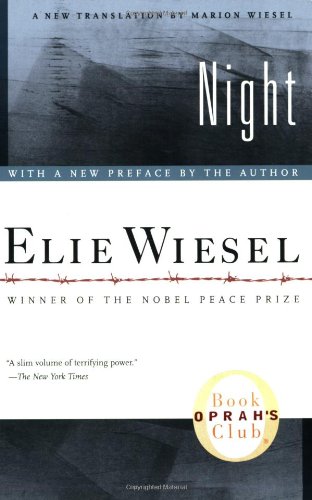All Nonfiction
- Bullying
- Books
- Academic
- Author Interviews
- Celebrity interviews
- College Articles
- College Essays
- Educator of the Year
- Heroes
- Interviews
- Memoir
- Personal Experience
- Sports
- Travel & Culture
All Opinions
- Bullying
- Current Events / Politics
- Discrimination
- Drugs / Alcohol / Smoking
- Entertainment / Celebrities
- Environment
- Love / Relationships
- Movies / Music / TV
- Pop Culture / Trends
- School / College
- Social Issues / Civics
- Spirituality / Religion
- Sports / Hobbies
All Hot Topics
- Bullying
- Community Service
- Environment
- Health
- Letters to the Editor
- Pride & Prejudice
- What Matters
- Back
Summer Guide
- Program Links
- Program Reviews
- Back
College Guide
- College Links
- College Reviews
- College Essays
- College Articles
- Back
Night by Elie Wiesel
This book really represents the saying “less is more.” For being such a small book it is tremendously powerful and moving. Night is a memoir about a young Jewish boy and his struggles during the Holocaust. Throughout the book the author grows into a man due to the experiences he has at only 15 years old. These experiences are absolutely horrific and terrible for anyone to see or go through. He witnesses many murders committed by the Nazis or by prisoners gone crazy. As well as watching people deteriorate, suffer, and eventually die. This would be very hard to watch because you are unable to help them and would cause massive amounts damage to your mental health. Eventually Elie becomes numb to these deaths because he has seen so many. That’s where you, as the reader, can tell how horrible it is, when death becomes a common thing and he is unaffected by it.
While in the concentration camps people are treated nothing more than like a dog. You are given a number and a small amount of food each day. Then, you have to work and march all day on this small amount of food. These conditions are very testing for Elie but somehow he is able to get by. His mind and thoughts become simple as well. He only thinks about surviving alongside his father and God. This is one of the ways it shows how the Nazis have made him mature. Instead of thinking about school and playing with his friends, he now must think about keeping himself alive, working, and following orders.
Towards the end of the book Elie’s dad becomes very sick. Elie is devastated because they have made it so far together that now so close to being liberated his dad is close to death. Nobody tries to help his dad only he does by giving him food and water. This frustrates him and makes him question God even more. This is another example of Elie maturing more and more. He has to try and support his own father from dying at only 16! This is an experience that nobody should have to go through, watching your dad die helplessly. His dad eventually dies, he was only about 50 years old. Elie describes his father in his last days as a “weak and frightened child.” This was very emotional to me because the Nazis were so harsh that they made a 50 year old man into a helpless child in front of his own son’s eyes. Also, Elie was unable to say goodbye to his father. The last thing his father said was his name “Eliezer” and asking him for water. Not being able to say goodbye to your father would be incredibly painful to me and just eat right through me. Then when he calls out to you asking for help and you are unable to be there for him is even more painful to your conscience. This part is the breaking point for me and was hard to read after that. The author writes after this that he had nothing to live for and his life was over. I can imagine this experience is a massive scar in Elie’s brain.
This book is easily the most emotional and moving book I have ever read. We must never, ever let this type of treatment happen to anyone. I have realized that I must cherish my teenage years and life in general before it is too late. As well, I must create relationships with my relatives that I will remember. Lastly, I will always refer to this when I think life is too hard and realize that it is nothing to what Elie Wiesel experienced.
Similar Articles
JOIN THE DISCUSSION
This article has 3 comments.


1 article 0 photos 3 comments